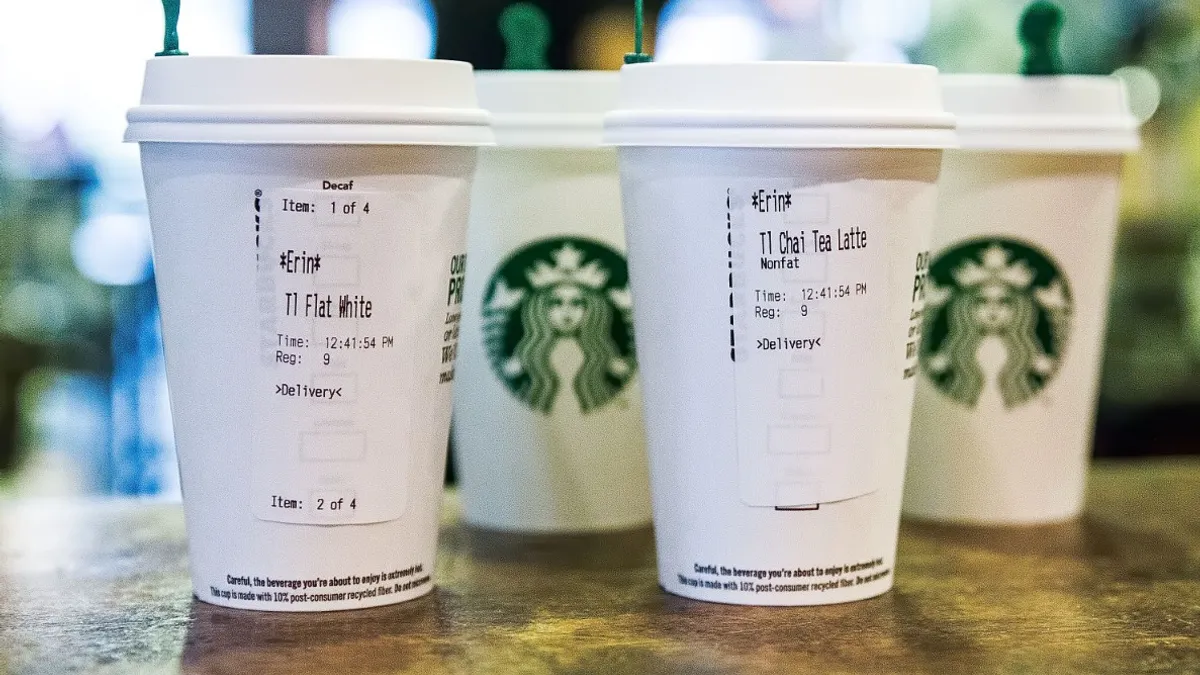Dive Brief:
- During its annual shareholders meeting this week, Starbucks announced it will start trials this year on different types of cups to achieve sustainability goals.
- The compostable and recyclable cups will be tested in select markets where local facilities can support processing them: London, New York, San Francisco, Seattle and Vancouver. The cup designs were among the NextGen Cup Challenge's 12 winners, which were announced in February.
- According to Starbucks, which plans to release lightweight, strawless lids at all locations in the U.S. and Canada, the new design contains 9% less plastic than the current lid-and-straw model. The lids will begin hitting stores this summer in Indianapolis, Los Angeles, San Francisco, Seattle, Toronto and Washington, DC and will be available in all stores by early next year. Starbucks released a strawless, sippable lid for cold drinks in select markets last year upon announcing it would eliminate straws from all stores by 2020.
Dive Insight:
Last spring, Starbucks announced a commitment of $10 million to establish a "NextGen Cup Challenge" in partnership with Closed Loop Partners. Multiple partners — including McDonald's, Yum! Brands and the Coca-Cola Company — joined the challenge in an attempt to develop scalable recycling solutions for the estimated 250 billion paper cups used around the world annually.
The competition reflects the profound challenge of recycling paper cups. While consumers generally assume they're recyclable, the paper cups have moisture-resistant coatings, which tend to be plastic. Like other products that merge multiple recyclable commodities into one product — such as bubble wrap-lined paper mailers and coffee pods — the combination renders them unrecyclable in most municipal programs. Some cities have proven an exception to that, when paper mill partners are agreeable. Denver became one of the latest to do so when it announced in December that residents could begin putting paper cups in their curbside carts.
While Starbucks' move toward recyclable packaging garnered accolades from some environmental advocacy groups, others say more needs to be done.
"Just because packaging is recyclable or compostable in an industrial facility, does not mean it will be recycled or composted. To truly tackle the plastic pollution crisis, Starbucks must significantly ramp up its investment in reusability, incentivizing customers to bring their own cups and mugs. Swapping out one throwaway material for another is not the real solution,” Greenpeace Plastics Campaigner Kate Melges said in a statement.
That raises a key point: the existence of a "recyclable" product doesn't automatically guarantee that consumers will sort it properly for recycling. To encourage that behavior, Starbucks may need to accompany this new packaging with a widespread educational campaign. Consumers need to understand how and where to recycle the different elements — for example, whether the cup can be tossed as-is in the average curbside recycling bin, or whether the plastic lid needs to first be separated from the cup.















